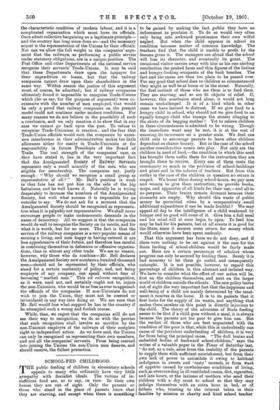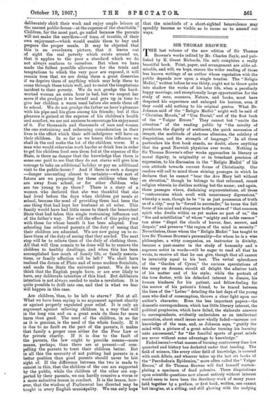SCHOOL-FED CHILDHOOD.
THE public feeding ef children in elementary schools appeals to many , who ordinarily have very little sympathy. with Socialist ideals. The victims of in- Sufficient food are, so to say,, on view. In their own homes thel. are out of sight. , Only the parents or those who stand in the place of parents know that they are starving, and except when there is something to be gained by making the fact public they have no inducement to proclaim it. To do so would very often only bring into awkward prominence their own wilful neglect. But when the child appears -in school its condition becomes matter of common knowledge. The teachers find that the child is unable to profit by the lessons given it. The managers are afraid that the school will lose its character, and eventually its grant.' The occasional visitor carries away with him as his one abiding recollection the peaked faces and thin figures of the listless and hungry-looking occupants of the back benches. The fact and the cause are thus too plain to be passed over. For any good that school does to children so circumstanced they might as well be at home or in the street. Naturally, the first instinct of those who see them is to feed them. They are starving, and so are fit objects of relief. If, however, this conclusion stood alone, it would not long remain unchallenged. It is of a kind which in other cases we have learned to distrust. If we give food to a hungry child in school, why should not we give food to an equally hungry child who tramps the streets clinging to the skirts of its begging mother ? Yet to relieve children in these circumstances is admitted to be wrong. Though the immediate want may be met, it is at the cost of ensuring its recurrence on a greater scale. We feed one child only to encourage parents to leave other children dependent on chance bounty. But in the case of the school another consideration comes into play. Not only are the children in need of food,—the condition to which this need has brought them unfits them for the instruction they are brought there to receive. Every one of them costs the community so much in the provision of school-buildings and plant and in the salaries of teachers. But from this outlay in the case of the children in question no return is reaped. We house them during school-hours, we pay men and women. to give them instruction, we provide books, maps, and apparatus of all kinds for their use,— and all to no purpose. Their brains remain dormant because their stomachs are empty. Why should this waste of public money be permitted when by a comparatively .small additional expenditure it can be made fruitful ? We may appeal.all day to the intelligence of a child weakened- by hunger and no good will come of it. Give him a full meal and his mind will at once begin to open. To feed him may be bad for his parents, but at all events it is good for the State, since it secures some return for money which would otherwise have been spent uselessly. . .
That this argument has force we do not deny; and if there were nothing to be set against it the case for :the State feeding of school-children would be fairly made out. Here are a certain percentage of scholars whose progress can only be secured by feeding them. Surely it is bad economy to let them go unfed, • and consequently untaught. It is not possible, however, to regard- this percentage of children in this abstract and- isolated way. We have to consider what the effect of our action will be, first on the children themselves, and next on the larger world of children outside the schools. The new policy leaves out of sight the very important fact that the happiness and well-being of a child are mainly determined 'by the treat- ment it receives in the home. It is to its parents that it first looks for the supply of its wants, and anything that makes them careless on this point is directly injurious to the child. The theory of the advocates of 'State feeding seems to be that if a child goes without a meal, it is always because the parents are too poor to give him one. . But the verdict of those who are best acquainted with the condition of the poor is that, while this is undoubtedly one cause of the prevalent underfeeding of children, it is very far from being the principal cause. "The dull brains and enfeebled bodies of backward school-children," says the writer of a valuable paper in the Times of Saturday last, "do not, as a rule, arise from the inability of the parents to supply them with sufficient nourishment, but from their own lack of power to assimilate it owing to habitual indulgence in sweets and ' tasty ' morsels, or from want of appetite caused by unwholesome conditions . of living, such as overcrowding in ill-ventilated, rooms, dirt, cigarettes, and late hours, or the laziness of mothers who send their children with a dry crust to school so that they may indulge themselves with an extra hour in bed, or of fathers who, trusting to the interest taken in their families by mission or charity and kind school teacher deliberately shirk their work and enjoy ample leisure at the nearest public-house—at the expense of the charitable." Children, for the most part, go unfed because the parents will not make the sacrifices—of time, of trouble, of their own enjoyment—which would enable them to buy and prepare the proper meals. It may be objected that this is an overdrawn picture, that it leaves out of sight the real poverty which exists around us, that it applies to the poor a standard which we do not always conform to ourselves. But when we have made the fullest possible allowance for the trials and temptations to which the very poor are exposed, it will remain true that we are doing them a great disservice. if we deprive them of anything which may help them to come through these trials well, and to resist the temptations incident to their poverty. We do not grudge the hard- worked woman an extra hour in bed, but we respect her more if she grudges it to herself and gets up in time to give her children a warm meal before she sends them off to school. We do not grudge the father an hour's pleasure with his pipe and his glass among his friends ; but if this pleasure is gained at the expense of his children's health and comfort, we are not anxious to encourage his enjoyment of it. For thousands and thousands of men and women the one restraining and redeeming consideration in their lives is the effect which their self-indulgence will have on their children. In so far as we lessen this influence we shall in the end make the lot of the children worse. If a man who would otherwise work harder or drink less in order to get his children food sees them fed at the expense of the State, is there up danger that the knowledge that there is some one paid to see that they do not starve will give him courage to take an additional holiday or pay an additional visit to the public-house ? And if there is such a danger —danger amounting almost to certainty—what sort of future are we preparing for these children when they are away from school, or for other Children who are too young to go there ? There is a story of a woman who declared that she was thankful that she had lived before the days when children got meals at school, because the need of providing them had been the one thing that had kept her husband at all sober. This family would have had little cause to thank the benevolent State that had taken this single restraining influence out of the father's way. Nor will the effect of this policy end with those for whose benefit it has been adopted. Free schooling has relieved parents of the duty of seeing that their children are educated. We are now going on to re- lieve them of the duty of seeing that they are fed. The next step will be to relieve them of the duty of clothing them. All that will then remain to be done will be to remove the children to healthy dwellings, and when this has been accomplished how much of family life, or family associa- tions, or family affection will be left ? We shall have realised the dream of Plato and of some modern Socialists, and made the State the universal parent. We do not think that the English people have, or are ever likely to have, any deliberate intention of this kind. But deliberate intention is not always needed to make a revolution. It is quite possible to drift into one, and that is what we fear will happen in this case.
Are cbildren;then, to be left to starve ? Not at all. What we have been saying is no argument against charity or against properly regulated poor relief. It is only an argument against relieving children in a way that will in the long rtin and on a great scale do them far more harm than good. The need of the children, in so far as it is genuine, is the need of the whole family. If it is due to no fault on the part of the parents, it makes that family a proper case either for the Poor Law or for private charity. If it is due to the fault of the parents, the law ought to provide means—more means, perhaps, than there are at present—of com- pelling the parents to treat their children better. But in all this the necessity of not putting bad parents in a better position than good parents should never be lo.st sight of. If the difference between the two is made to consist in this, that the children of the one are supported by the public, while the children of the other are sup- ported by their parents, we can hardly conceive a worse or a more seductive lesson in conduct. It is the lesson, how- ever, that the wisdom qf Parliament has directed may be taught in every English municipality. We can only hope that the mischiefs of a short-sighted benevolence may speedily become so visible as to cause us to amend' our ways.











































 Previous page
Previous page